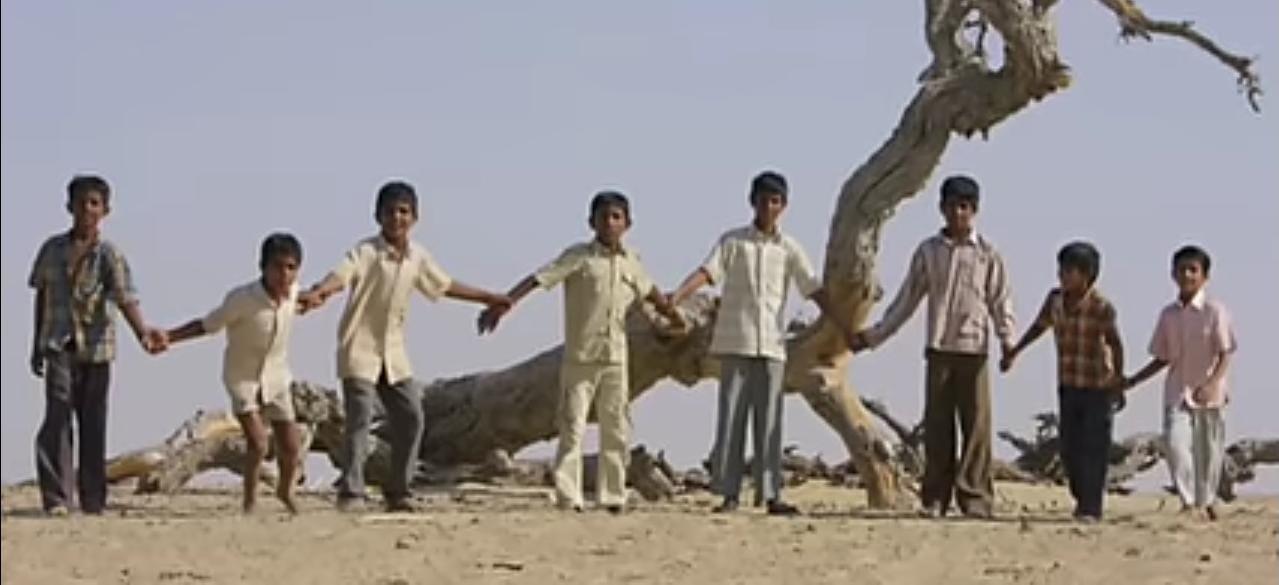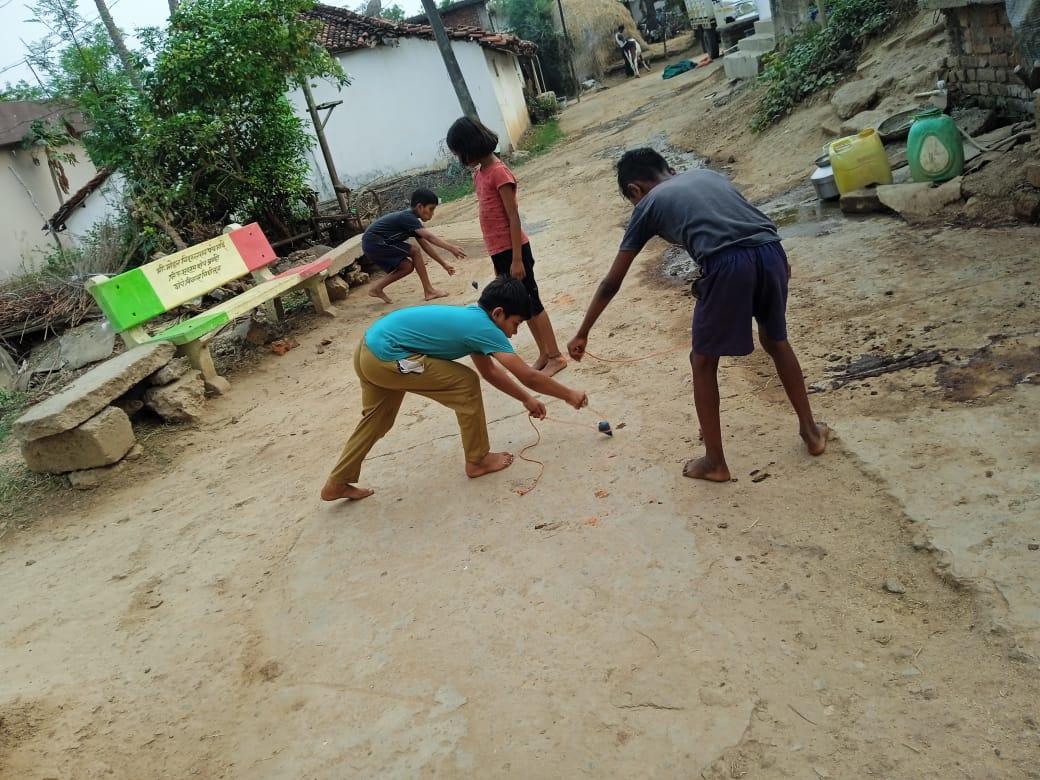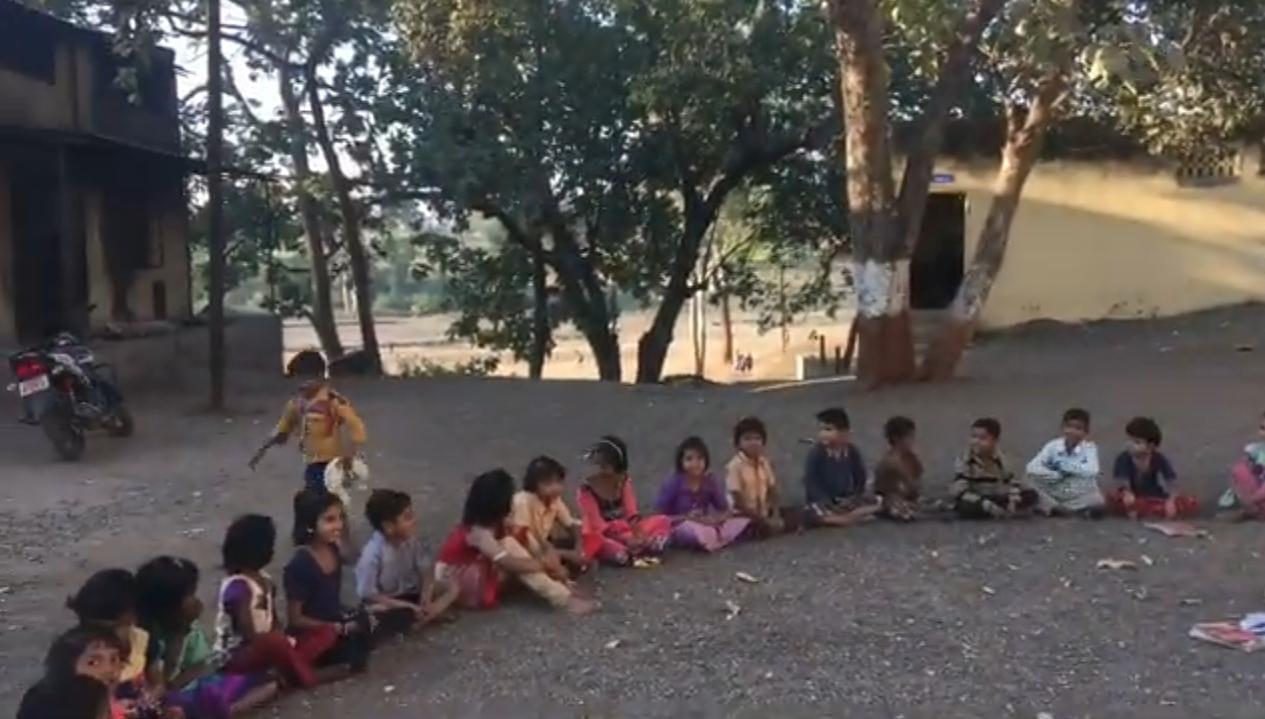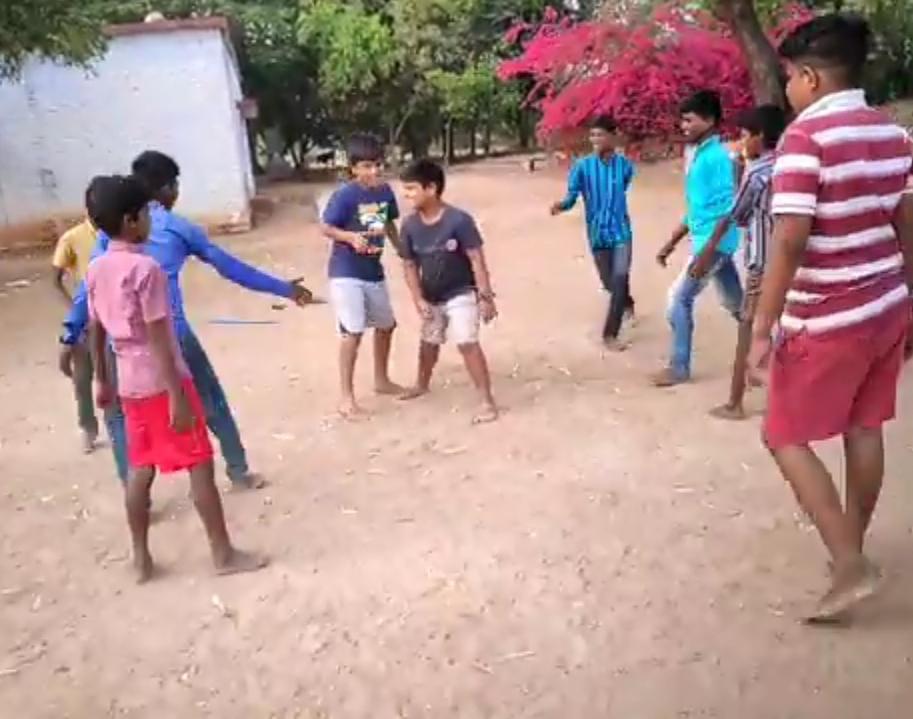Contents
- Traditional Games
- Kabaddi
- Kho-Kho
- Viti-Dandu
- Kusti
- Sakhali
- Bhavra
- Local Traditional Games That No Longer Exist
- Suva Khupasni
- Shivaji Mhanto Dhava Dhava
- Tappe Ball
- Madhach Pola
- Chichur Mendha
- Mai Shivaji
- Aai cha Patra Haravla
- Ice Water
- Chipak Chipak Bhinti
- Clap Games
- Chit Games
- Competitive Sports
- Sepak Takraw
- Kabaddi
- Atya Patya
- Sport Personalities
- Vaibhao Chawale
- Nikhil Kohad
- Nikesh Sandekar
- Sports Infrastructure
- Sources
BHANDARA
Sports & Games
Last updated on 21 July 2025. Help us improve the information on this page by clicking on suggest edits or writing to us.
In earlier times, children's play was a central aspect of life in Bhandara. However, like many other places, it has declined over time with the rise of technology. The perspective on sports in the district has changed significantly; while many in Bhandara once viewed playing games as a waste of time, there is now a growing interest in pursuing sports as a career. Consequently, people are increasingly focused on this goal. This shift in perspective has evolved over time, as awareness about the benefits of pursuing sports has increased. Parents are now more inclined to encourage their children to become athletes.
Sports have always been part of Bhandara’s culture and festivals. After Diwali, every village in Bhandara organizes a Mandai, which is a kind of fair that attracts many migrants returning to their villages for those 15 days. In this context, Akhara events are held during the Mandai. It is rare for a Mandai to be celebrated without organizing at least one day of Akhara sports, where local participants compete and have the chance to win prizes. The entire village gathers to watch these Akhara events.
Another prominent game celebrated during the festival of Nag Panchami is "Limbu Fekane." In this game, people bet money on players to see who can throw a lemon the farthest. The player with the most money wagered on them and who throws the lemon the farthest wins the game and collects all the bets.
During Dussehra, Bhandara uniquely celebrates Patangostav, where a large kite festival takes place, creating an informal competition among participants. Gambling and playing cards are also popular during festivals like Lakshmi Poojan on Diwali, Padwa (the day after Pola), and Holi, with about 60% of Bhandara's population engaging in card games and gambling during these celebrations, often referring to it as “Shastra.” Additionally, "Naral Fodani" is a tribal game prominently played by the Burad community on the second day of Narali Purnima, where participants attempt to break a coconut hung high using agile bamboo sticks.
Traditional Games
Kabaddi
Bhandara has several kabaddi clubs that offer training and competition for players. Notable clubs include Sahil Cricket Academy, which provides coaching programs led by experienced trainers, focusing on skill development and fitness. Additionally, various local kabaddi clubs give players opportunities to train and compete at different levels. The kabaddi scene in Bhandara is quite active, with recent competitions taking place against teams from nearby districts. For example, the Bhandara district team participated in the 70th Senior State Championship, showcasing local talent in matches against teams like Nagpur City.
Social media plays an important role in promoting kabaddi in Bhandara. The official Instagram account of Bhandara Kabaddi shares updates about matches, training sessions, and community events related to the sport, helping to engage fans and players alike.
Kho-Kho
Kho-Kho is a traditional tag sport originating from ancient India, recognized for its dynamic and strategic gameplay. It involves two teams, with one team acting as the chasers and the other as the runners. The objective of the chasers is to tag the runners while adhering to specific rules that govern movement and interaction. Bhandara hosts several kho-kho clubs that provide training and competitive opportunities for players. These clubs focus on skill development, teamwork, and fitness. Local organizations often organize training sessions to encourage participation among youth.
The region has several sports grounds suitable for kho-kho practice and competitions, including Dasera Maidan, Railway Ground Bhandara, and Sahakar Nagar Ground.
Viti-Dandu
Viti Dandu, also known as Gilli Danda, is a traditional Indian street game that has been enjoyed for generations. It is played with two sticks: a long stick called the danda and a smaller, tapered stick known as the gilli. The game is typically played outdoors and can accommodate various numbers of players, usually divided into two teams. In Bhandara, Viti Dandu is often played in local neighborhoods and schools, making it a popular pastime among children and young adults. While specific clubs for Viti Dandu may not be as prominent as those for other sports, local parks and playgrounds serve as informal venues for playing this traditional game.
Kusti
In Bhandara, Kusti wrestlers typically train in akhadas, which are dedicated wrestling gyms. The training regimen starts early in the morning, often around 4 or 5 AM, and includes exercises, practice matches, and strength-building activities. Wrestlers follow a strict lifestyle that emphasizes discipline, with restrictions on certain foods and substances like alcohol and tobacco. Their diet is usually high in energy to help build body mass and strength. Bhandara hosts various Kusti competitions throughout the year, attracting wrestlers from different regions. Events such as the Guru Hanuman Bharat Kesari Dangal showcase local talent and provide a platform for wrestlers to compete at higher levels.
Sakhali

In this group game, one player catches another, and the two then join hands to catch a third player. This chain continues to grow as more players are caught and join hands. The game ends when only one player remains uncaught. The last player caught is the winner, while the first player caught is considered the loser. The game is named Sakhali Shiva-Shivi due to the chain-like formation of players holding hands.
Bhavra

In Bhandara, it remains a popular summer pastime for children. The game involves a triangular toy called Bhavra, which has notches for wrapping a rope. When the rope is pulled, the Bhavra spins rapidly on the ground. Kids often add their twists to the game, such as spinning the Bhavra with their hands or inventing new variations. There is a local belief that the game's spinning motion is somehow connected to the rotation of the Earth.
Local Traditional Games That No Longer Exist
Suva Khupasni
This traditional game was especially enjoyed during the monsoon season and involved playing in the mud. In the past, when roads were unpaved, mud would accumulate everywhere during the rains. Players would throw an iron rod, known as a "suva," into the mud. If the rod stood upright and became embedded in the ground, players could advance from that spot. However, if the rod fell horizontally, players had to limp back to the starting point from where it landed. The challenge and fun came from both the distance players could throw the suva and how far they had to limp back.
Shivaji Mhanto Dhava Dhava
In this popular children's game, one player stood in the center while others ran around in a circle. The central player gave commands using phrases like "Shivaji Mhanto Dhava Dhava" (Maharaj Shivaji says run), prompting everyone to run. When the command was "Shivaji Mhanto Thamba Thamba" (Shivaji says stop), players had to halt. For "Shivaji Mhanto Udiya Mara" (Shivaji says jump), they jumped, and "Shivaji Mhanto Jodya Banva" (Shivaji says form pairs) required them to pair up. The rapid commands could confuse players, and those who failed to follow correctly were eliminated. The game not only improved children's concentration but also allowed them to imagine themselves as Shivaji Maharaj and his Mavale warriors.
Tappe Ball
In this straightforward game, children hit a ball against a wall and caught it while performing various actions, such as yoga poses or other exercises. This playful activity combined physical exercise with entertainment, encouraging children to stay active while playing.
Madhach Pola
In this engaging group activity, children formed a tight, unbreakable formation resembling a honeycomb by standing close together. A designated player tried to break this formation by applying pressure. If successful, they won, and the first child to break away from the honeycomb joined the challenger in attempting to break it again. This game enhanced physical strength and promoted teamwork among children.
Chichur Mendha
This group game involved players standing inside a drawn circle, with one player outside. The outside player would ask questions like "Chichur Mendha Jamin Kon?" (What is the ground in the game?), to which the insiders would respond with "Patthar" (stone). When the outside player asked "Chor Kon?" (Who is the thief?), the named insider had to quickly exit the circle. If they failed, the group inside would hit them. The outside player and the named person then formed a team to force the remaining insiders out of the circle. The last person remaining inside won. This game was inspired by local tribal stories involving livestock theft.
Mai Shivaji
In this game, one player was designated to catch others but could only catch someone who said "Mai Shivaji" (I am Shivaji). If another player intervened by saying "Mai Shivaji," the catcher had to switch targets. The game continued indefinitely, creating a dynamic where players had to strategically use the phrase to avoid being caught. This game reflected the historical stories where Shivaji Maharaj was protected by his followers who confused enemies with decoys.
Aai cha Patra Haravla

In this group game, all players form a circle while one player, holding an object referred to as the "Aai cha Patra" (the mother’s letter), runs around the outside of the circle. As they run, they mumble the rhyme, "Aai cha patra harvla te konala sapadla," which translates to "My mother’s letter is missing; who finds it and drops it behind someone?" The player then drops the object behind one of the seated players. If the seated player discovers the object and stands up, they must throw it back and try to tag the running player. If the running player can return to the vacant spot before being tagged, they win. This game is commonly played in schools.
Ice Water

In this group game, players run around while one player is designated as the catcher. When the catcher tags another player and says "Ice," that player must freeze and remain stationary. Meanwhile, other players on the catcher’s team try to touch the frozen player to "turn them into Water," allowing them to move again. The game continues as players run and tag each other, making it an engaging and nearly endless activity.
Chipak Chipak Bhinti
In this game, players must stick to a wall but are not allowed to remain in one position. They need to move around while staying in contact with the wall. If a player changes their position and is caught by another player during this movement, they lose. The objective is to keep adhering to the wall while avoiding being caught.
Clap Games
These games involve chanting Hindi rhymes in a playful manner, reflecting the local influence from the nearby Madhya Pradesh border. Examples of these rhymes include:
- "Awdar powder powder ka dibba, bolo bacche kitne baje, ek do tin char, char me ayi bus, bus me bethi rekha amitabh bacchan ne dekha, amitabh bacchan ki sali bhaje banane wali bhaje ho gaye thande maro usko dande." Translation: "Awdar powder powder box, tell me what time it is, one, two, three, four. At four o'clock, a bus arrived, and inside the bus sat Rekha. Amitabh Bachchan saw her, and Amitabh Bachchan's sister-in-law made fritters. Now they're cold; hit them with a stick."
- "Niche pan ki dukan upar nani ka makan, nani so rahi thi munna khel raha tha, munne ko chot lagi doctor ko bulao, doctor ki sui tuti nurse ko bulao, nurse ki chappla luti police ko bulao. Police ki chhadi tuti taliya bajao." Translation: "Below is a shop and above is grandmother's house. Grandmother was sleeping while Munna was playing. Munna got hurt, so call the doctor. The doctor's needle broke, so call the nurse. The nurse's slippers were stolen, so call the police. The police's stick broke, so clap your hands."
- "1,2,3, kabhi upar kabhi niche kabhi daye kabhi baye, tere papa mere papa doctor doctor doctor, teri mummy meri mummy teacher teacher teacher, tera bhai mera bhai boxer boxer boxer, teri bahen meri bahen dancer dancer dancer, tu aur main topper topper topper." Translation: "1, 2, 3, sometimes up, sometimes down, sometimes right, sometimes left. Your father, my father, doctor, doctor, doctor. Your mother, my mother, teacher, teacher, teacher. Your brother, my brother, boxer, boxer, boxer. Your sister, my sister, dancer, dancer, dancer. You and I, topper, topper, topper."
Chit Games
These involve various card-like games using roles written on paper slips (chits):
- Chor Chithya: Four chits are created with roles such as Police, Daroga (Inspector), Sipai (Constable), and Chor (Thief), each assigned a different number of points. Chits are drawn randomly, and players must guess each other's roles. If the police correctly identify the thief, the thief loses points. If not, the thief gains points.
- Char Chithya: This is a card game where players create four chits with the same code name. Each player selects different names and makes chits accordingly. The chits are then tossed, and players try to collect four chits of the same name. The first to complete this task wins.
Competitive Sports
Sepak Takraw
Initially, this game was played informally by people who had heard about it and were passionate about sports, as there was limited awareness of Sepak Takraw. Local enthusiasts played on makeshift courts in open fields and began organizing impromptu tournaments among themselves. However, interest in the game has since increased as people have become more aware of modern sports. As a result, some district-level competitions are now organized, allowing players from nearby towns to showcase their talent. School sports teachers and trainers from sports clubs like Krida Sankul Academy are available to train the players. A prominent figure in this game is Mohan Dadhi, who was once the best player in the district and now specifically trains female players.
Kabaddi
There used to be a designated Kabaddi area in Bhandara district known as "Kabaddi Kshetra." This was farmland outside the village where people gathered to watch Kabaddi games, and all matches were held there. Although that land is no longer available in Bhandara district, the passion for Kabaddi remains strong, with large grounds where children can play.
Atya Patya
Atya Patya is a traditional South Asian tag sport primarily played in rural areas of India, especially in Maharashtra. The game involves two teams, each consisting of nine players, and is often described as a "game of feints." The playing area features nine trenches on either side of a central trench. Points are awarded to the attacking team for each trench they cross without being tagged out by the defensive players.
In Bhandara, Atya Patya is the second most popular sport after Kabaddi. Initially, it was just an entertainment game, but after the establishment of the headquarters of the Atya Patya Federation of India in 1982 in Nagpur, it has evolved into a recognized sport. Although this game has not gained widespread recognition, the passion for it among the younger generation in the district is commendable.
Sport Personalities
Vaibhao Chawale
Vaibhao Chawale is a notable sports personality from Bhandara, Maharashtra, known for his contributions to local athletics. He has played a key role in inspiring young athletes and promoting sports in the region. Chawale gained international experience by participating in events in Milwaukee, USA, which has helped him bring valuable insights back to his community. His influence has earned him the nickname "Bandra," highlighting his recognition in the sports arena.
Nikhil Kohad
Nikhil Kohad is an emerging sports personality from Bhandara, Maharashtra, known for his achievements in fencing. He represented the Maharashtra team at the 36th National Games held in Gujarat, where he secured a silver medal, showcasing his talent and dedication to the sport.
Nikesh Sandekar
Nikesh Sandekar is a prominent figure in the local cricket scene from Bhandara, Maharashtra. He is a member of the Bhandara Panthers cricket team, which competes in various local tournaments. His involvement in cricket has contributed to the sport's popularity in the region, inspiring many young players to take up the game.
Sports Infrastructure
Today, there are only four to five gyms in Bhandara district, and the crowd attending them is very limited. People are either not very aware of gyms or lack confidence in the process. Nevertheless, old Vyayamshalas (gymnasiums) continue to operate in Bhandara. Open gyms have been established in all the gardens, but children are often seen playing there, while adults prefer yoga for females and Vyayamshalas for males. The existence of old Vyayamshalas is still prominent in Bhandara, where traditional methods of exercise can be observed.
Sources
Amit Sampat. 14 February 2019. Chess prodigies Divya, Raunak youngest to get Shiv Chhatrapati Award. Times of India.https://timesofindia.indiatimes.com/spotligh…
Instagram. Bhandara Kabaddi Official. Instagram.https://www.instagram.com/bhandara_kabaddi_o…
NCK SPORTS. Bhandara District vs Nagpur City | 71st Senior State Championship 2023 | Yavatmal Kabaddi Match. YouTube. NCK SPORTS.https://www.youtube.com/watch?time_continue=…
Last updated on 21 July 2025. Help us improve the information on this page by clicking on suggest edits or writing to us.